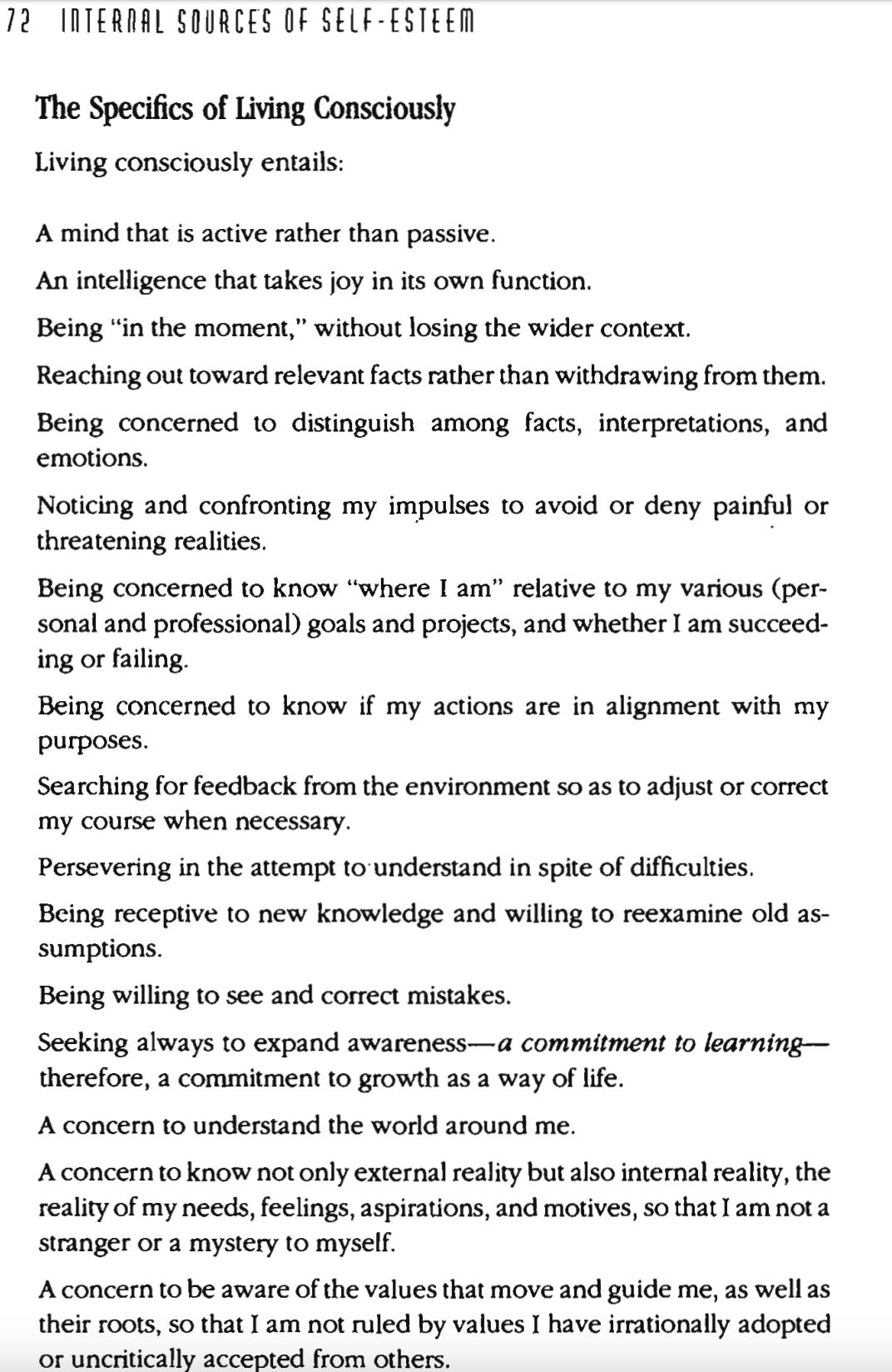
《自尊的六大支柱》
我看到英文原版。我没找到中文版,只看到中英文对照版。我觉得看起来麻烦,就直接看英文的了。
对中英对照版感兴趣的朋友可以看这里 。
总言 #
这本书是一个朋友推荐给我的。我一开始并没有太多的期待,但是读完之后感觉收获挺大的。下面,我会尝试用自己的语言把这本书的内容串起来。
在讲自尊之前,我们先要明确自尊是什么。在说明之前,先看两句话:
- 知道你自己是谁、相信自己
- Your life is important. Honor it. Fight for your biggest possibilities.
有感觉吗?
作者认为,自尊有两部分组成:自我效能(有自信面对人生困境)、自我尊重(觉得自己配得上幸福)。我总结为两点:
- 我可以 (确信感)
- 我值得 (配得感)
高自尊和以下的特质有关联:理性 (rationality)、现实 (realism)、直觉 (intuitiveness)、创造性 (creativity)、独立 (independence)、可塑性 (flexibility)、可应对变化、积极承认并改正错误、善良与合作
低自尊的人有以下特点:
A sense of inadequacy, of not being “enough”, a feeling of guilt or shame or inferiority, a clear lack of self-acceptance, self-trust, and self-love. In other words, a problem of self-esteem.
也就是说,低自尊的表现是:觉得自己做不到、自己不够好、认为自己低人一等、内疚、羞耻、不接受自己、不信任自己、不爱自己。
有一点让我没想到,作者说,自尊再强都无所谓,就像人永远不可能「过于健康」。因此,自豪 (pride) 无罪,应当鼓励。杨笠说的「普信男」,在这一观点下,根本不值得去辩论。实话讲,如果一个很普通的人,对自己「过于自信」,我想拜他为师。如果现实不断打击依然自信不减,这种信念下,这个人最后不成功是一个比行星撞地球还小概率的事件。
这里,作者提到另一点,当现实和我们深信的自我 (self-concept) 冲突时,我们总会改变现实来验证自我,即使这意味着摧毁我们现有的幸福。
这句听看起来很普通,甚至有些绕,但是它让我感到震撼。类似的话我肯定听过,比如「境随心转」、「意识决定一切」、「万法唯心造」。但作者的表述让我真实地看到了这种能量运作的模式。就像上面提到的,极度「普信男」,现实会被他的强烈信念所扭曲,变成他以为的样子。相反的,一个觉得自己什么都配不上、做不到的人,即使自己有能力、有运气,现实中也会被他的信念影响。
那我们该如何提高自己的自尊?为什么有些人成就很大但依然低自尊呢?作者的建议是,问一下自己,你的这些成就,有哪些是你自己想做的,哪些是别人让你做的。
作者的观点是,我们本该通过提升意识、承担责任和维持正直来提高自尊,最后却通过名望、财富、性经历来获取它。作者说,只有世俗的成功而没有强大的自尊,我们注定会觉得自己像个等待被揭穿的骗子。我对这句话的理解是,当我们的自尊不是来自于内心,而是来自于外在成就,这种自尊是假的。
The acclaim of others does not create our self-esteem. Neither does erudition, material possessions, marriage, parenthood, philanthropic endeavors, sexual conquests, or face-lifts. These things can sometimes make us feel better about ourselves temporarily or more comfortable in particular situations. But comfort is not self-esteem. 万人景仰无法建立你的自尊。学历、金钱、爱情婚姻、子女、做慈善、征服异性、美容也都无法让你拥有自尊。它们也许会让你短暂地自我感觉了良好或者更舒服。但感到舒服并不是自尊。(我自己演绎翻译的,有自己的发挥,并非严格直译)
自尊不是外在成就,而是意识的提升。
把自我价值建立在别人的评价上是极其危险的。
自尊的六大支柱 #
作者讲到,自尊有以下六个组成部分:
- 带着觉知生活 (Living Conciously)
- 接纳自己 (Self-Acceptance)
- 对自我负责 (Self-Responsibility)
- 肯定自己 (Self-Assertiveness)
- 有目标地活着 (Living Purposefully)
- 正直 (Personal Integrity)
带着觉知生活 #

The specifics of living consciously
我的理解是:知道自己的人生目标是什么,时刻觉察自己是否在完成目标的路上,觉察自己内在 (价值观、念头、动机、情绪) 和外在 (行为),觉察外部世界,觉察内在和外在的关联。
一个例子:
Being concerned to know if my actions are in alignment with my purposes.
我觉得这是一个很棒的例子。
还有:
Persevering in the attempt to understand in spite of difficulties.
A concern to understand the world around me.
我的理解是,不管再难,我也要坚持着寻找真理、理解这个世界。
Being concerned to know “where I am” relative to my various (personal and professional) goals and projects, and whether I am succeeding or failing.
这个真的太重要了。要知道自己在往哪里走,不断检视自己是否在正确的道路上。
Searching for feedback from the environment so as to adjust or correct my course when necessary.
Seeking always to expand awareness–a commitment to learning–therefore, a commitment to growth as a way of life.
充满警觉和客观地觉察自己与外界互动后产生的反应,根据这些调整自己和认知。
A concern to be aware of the values that move and guide me, as well as their roots, so that I am not ruled by values I have irrationally adopted or uncritically accepted from others.
这个也非常有道理。如果我不检视我的价值观,我就看不到我所有行为的内驱力是什么。
A concern to know not only external reality but also internal reality, the reality of my needs, feelings, aspirations, and motives, so that I am not a stranger or a mystery to myself
要对自己内在的一切保持觉察。
接纳自己 #
第一层:
Self-acceptance is my refusal to be in an adversarial relationship to myself.
也就是说,和自己和解,不再和自己对抗。
第二层:
接受自己的一切:身体、情绪、念头、行动、梦想。没有一个是自己需要去对抗、排斥的。
第三层:
对自己充满慈悲,与自己做朋友。当自己做了错事,不抗拒事实,但是要考虑到当时自己的情况,充满慈悲去尝试理解自己。
在我看来,一个完完全全和自己和解,接受自己内在、外在一切的人,不管外在成就如何,内在必定是十分安稳的。
对自己负责 #
对自己的人生和身心健康负责
对实现自己的欲望负责
对自己的选择和行为负责
对自己如何支配时间负责
对自己的沟通方式负责
对自己的幸福负责
对自己的价值观负责
对自己的自尊负责
肯定自己 #
这部分我感触很深。当我处于低自尊状态时,我确实想让自己的身体缩成一团,我感觉自己不应该占据任何空间。
Some people stand and move as if they have no right to the space they occupy. 但是,自尊意味着我们相信:
I have a right to exist. 我有权存在。
肯定自己的希望、需求、价值。
Self-assertiveness means the willingness to stand up for myself, to be who I am openly, to treat myself with respect in all human encounters.
这句话也让我非常触动,对我的影响很大。它让我想到,一个高自尊的人,是一个无时无刻不在维护自己的人。他不是永远正确,也不是高傲,但是他永远维护自己的尊严,不允许任何人践踏。他接受批评,但不会容忍羞辱。即使自己犯再多错误,他也坚信自己可以走上正确的道路。也就是在任何极端情况下,哪怕自己成为一个杀人犯,都尊重自己,绝不谴责自己、鞭打自己。
My life does not belong to others and I am not here on earth to live up to someone else’s expectations.
这是独立。
敢于做真实的自己。对自己百分百真实、忠诚。
有目标地活着 #
有意识地制定目标、知道实现目标要采取什么行动、监测自己的行为,确认自己在实现目标的路上
Purposeful men and women set productive goals commensurate with their abilities, or try to.
To live purposefully is to be concerned with these questions: What am I trying to achieve? How am I trying to achieve it? Why do I think these means are appropriate? Does the feedback from the environment convey that I am succeeding or failing? Is there new information that I need to consider? Do I need to make adjustments in my course, or in my strategy, or in my practices? Do my goals and purposes need to be rethought? Thus, to live purposefully means to live at a high level of consciousness.
自律 #
Self-discipline is the ability to organize our behavior over time in the service of specific tasks.
Self-discipline requires the ability to defer immediate gratification in the service of a remote goal. This is the ability to project consequences into the future-to think, plan, and live long-range. Neither an individual nor a business can function effectively, let alone flourish, in the absence of this practice.
我对「有目标地活着」是这么理解的:它不在于我们是否取得什么伟大的成就,而在于让自己熟练掌握「让想法变为现实」的能力。
正直、诚实 #
言行一致
可以后悔,但请不要内疚。
教育、社会 #
如何让孩子有高自尊:
- 保证孩子安全
- 肢体触碰
- 爱
- 接纳
- 尊重
- 「看见」
作者将到父母教育、学校对自尊的影响,我理解到为什么我有低自尊的问题。
The average person tends to judge him- or herself by the values prevalent in his social environment, as transmitted by family members, political and religious leaders, teachers, newspaper and television editorials, and popular art such as movies. These values may or may not be rational and may or may not answer to the needs of the individual.
这句话背后的意义非常深刻。家庭、学校、社会、媒体影响了我们的价值观。但是这些价值观并不一定对,更不一定和我们内在最深刻的渴望相匹配。
Genuine self-esteem is what we feel about ourselves when everything is not all right.
这句话在我看来是整本书的精髓。自尊是当一切都很糟的时候,我们的感觉。如果我没有任何成就,没有任何自律,挣不到钱,受到别人的谩骂、攻击、排斥,等等,我对自己的是什么态度?我依然可以爱自己、接纳自己、肯定自己吗?如果不能,那我的自尊就不是完整的。
One of the biggest lies we were ever told is that it is “easy” to be selfish and that self-sacrifice takes spiritual strength. People sacrifice themselves in a thousand ways every day. This is their tragedy. To honor the self–to honor mind, judgement, values, and convictions–is the ultimate act of courage. Observe how rare it is. But is what self-esteem asks of us.
这句话我看到后有一种震惊的感觉。离这本书出版已经有 30 年的时间了,这句话的真实性依旧不减。我们总是被教育说「无私」是好的,人不能太自私。自我牺牲式高尚的。作者却说,自私其实很难。我们收到社会的洗脑,总是害怕维护自己的利益,或者收到煽动,为了名族大义、社会利益而牺牲自己,以为自己很了不起。作者说,人们有一万种牺牲自我的方法和理由,那是他们的悲剧。牺牲自己我并不需要多大的勇气,反而是在道德的席卷下,依然可以去面对最真实的自己,才是需要勇气的。
和懒惰、逃避不适作斗争。
Neither struggle nor pain has intrinsic value. When they can be avoided with no harmful consequences, they should be.
痛苦和挣扎本身并没有价值。歌颂苦难是毫无道理的。
我的总结和思考 #
我现在不去回想这本书的内容,以下是让我记忆犹新的点:
- 外在成就没办法改变你的自尊。自尊必须向内求。
- 知道自己的目标,不断检视自己的行为,确认自己在完成目标的路上。
- 自律。和懒惰作斗争。
- 觉察自己的情绪,接受自己的情绪。当自己不想工作,觉察,认可自己,但是依旧去做自己该做的事情。
- 学会自私。勇敢地自私,在不故意损害别人利益的情况下。
- 学会觉察社会、家庭、媒体对自己的洗脑。要知道,对自己诚实才是最重要的,不要按照别人和社会的期望过一辈子。
- 当一切很糟糕的时候,才是最检验自尊的时候。
- 在任何情况下,无条件为自己撑腰,无条件相信自己。即使自己做了天大的错事,也不能贬低自己、伤害自己、讨厌自己。
最后一次修改于 2025-06-03 • 编辑本页